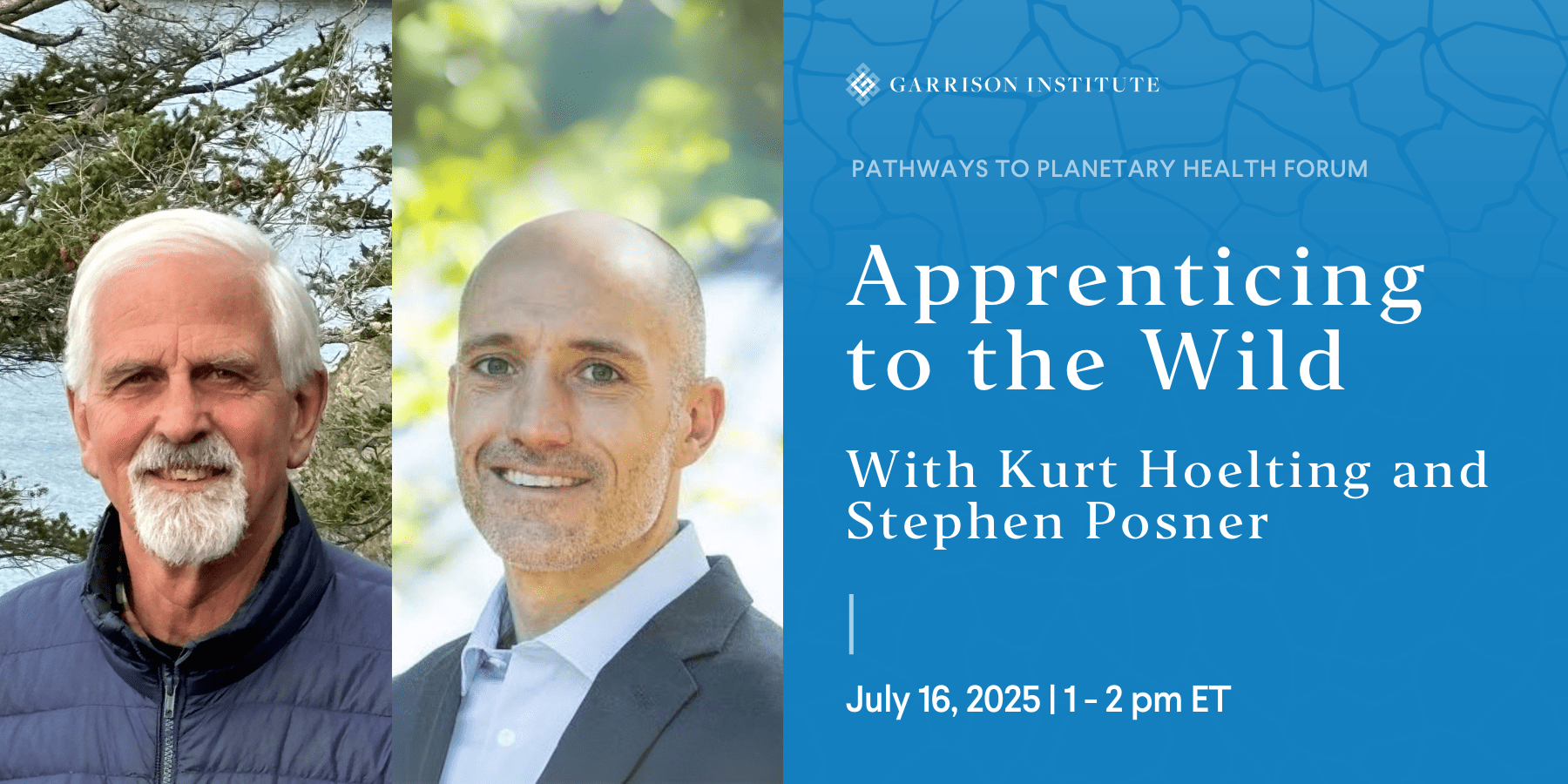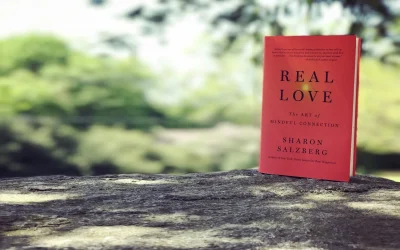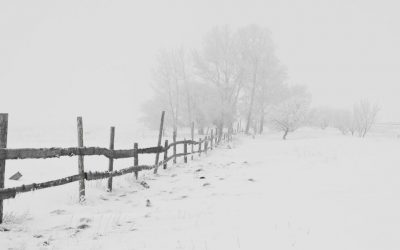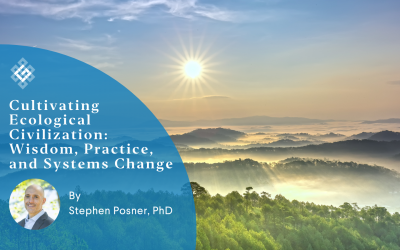Lessons on Presence, Eldership, & Resilience with Kurt Hoelting & Stephen Posner
On July 16, 2025, the Garrison Institute hosted an online forum with author and Zen practitioner Kurt Hoelting in dialogue with Stephen Posner, Director of the Pathways to Planetary Health initiative. Their conversation explored what it means to apprentice to the wild—a lifelong practice of cultivating presence, resilience, and belonging in relation to both inner and outer wildness.
Drawing from decades as a commercial fisherman, wilderness guide, and mindfulness teacher, Kurt shared insights from his new book Apprentice to the Wild, offering a perspective on how nature can be our most enduring teacher.
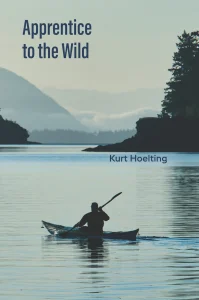
Arrival and Presence
Kurt opened the session by inviting participants into a brief mindfulness practice: a conscious breath, a moment to feel one’s body, and a reflection on the uniqueness of the place each person inhabits. He followed this practice with a reading of David Wagoner’s poem “Lost,” which encourages the reader to stand still, let the forest find them, and treat “here” as a “powerful stranger” – like an invisible presence that can be returned to in every place.
This grounding invitation set the tone for a conversation rooted in deep listening and relational presence.
The Meaning of Apprenticing to the Wild
For Kurt, apprenticing to the wild carries a dual meaning. It refers to encounters with wilderness—the outer wild of Alaska’s mountains and the Pacific Northwest’s salmon-filled rivers. Additionally, it describes the inner wild of the human heart and mind – a terrain of mystery, uncertainty, and natural vitality.
Raised near Puget Sound in Washington and drawn north as a young man, Kurt spent decades commercial fishing in Southeast Alaska. The intensity of this work, combined with his Zen practice as well as learning and teaching with poet Gary Snyder and Mindfulness-Based Stress Reduction (MBSR) founder Jon Kabat Zin, inspired him to create Inside Passages, a wilderness guiding company offering contemplative sea-kayaking expeditions.
For 25 years, Kurt led groups deep into the Tongass backcountry of Southeast Alaska, weaving silence, meditation, and mindful presence into journeys alongside humpback whales and migrating salmon.
Kurt has noted, “It’s been said we will not work to save that which we do not love. My deeper goal [leading wilderness retreats] was to catalyze a visceral connection with our own wild nature, through which we can more deeply value the nature around us.”
Place as Teacher
Throughout the conversation, Kurt returned to the theme of place as a teacher. Identifying as a citizen of “Salmon Nation,” he emphasized the deep time connections between identity, culture, and the ecology of a place.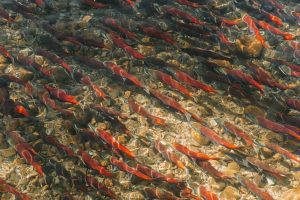
For Indigenous communities across the Pacific Rim, salmon ceremonies reinforced the understanding that human well-being is interconnected with the rhythms of the natural world.
Kurt described his book as, in part, a letter to his grandchildren—a way of passing along the wisdom that who we are is inseparable from where we are. “The practice of place,” he noted, is increasingly endangered in a digital era that pulls us away from direct experience.
Yet the analog dimension of life—the immediate, embodied relationship with land, water, and community—remains essential for joy and resilience.
Wildness in Daily Life
While Kurt’s expeditions in Alaska offered dramatic encounters with wildness, he emphasized that the wild is never far away. “There is no place where we can escape from the wild,” he explained, pointing to the living processes of our own bodies as manifestations of wild nature.
Stephen illustrated this by sharing a recent encounter with a family of gray foxes in Vermont—a reminder that wildness persists in all landscapes. Moments of encounter such as this invite us to respect and ‘re-spect’ – to see again – the presence of other beings who belong to a place and the relationships that define a place.
This theme extends to human experience as well. Kurt spoke about teaching mindfulness to veterans at the VA hospital in Seattle, describing it as a different kind of wilderness: a terrain of suffering, resilience, and healing.
“The human wild,” he said, “is very literal.” Whether in the silence of a forest or the vulnerability of a hospital ward, apprenticing to the wild means learning to meet life as it is.
Practicing Uncertainty
One of Kurt’s central teachings is the wisdom of uncertainty. Drawing from Zen traditions, he described uncertainty as an ally rather than a threat.
Kurt shared, “The easiest way to gain some freedom from fear is to acknowledge that we cannot control the future. Uncertainty opens us to surprise, gratitude, and joy… Not knowing is most intimate.”
He also offered a provocative reminder: “Despair is optional.” In a time when the news cycle magnifies fear and catastrophe, he encouraged cultivating practices of presence and gratitude as ways to remain grounded and engaged without succumbing to hopelessness.
Stephen connected this perspective to resilience, noting that unhurried human connection, gratitude, and attention to “small truths” can carry us through uncertainty more effectively than clinging to predictions or outcomes.
Eldership as Beginning
The conversation wove together deeply moving threads, such as Kurt’s reflections on elderhood. Retiring from guiding trips in Alaska at age 71, he wondered what might lie ahead.
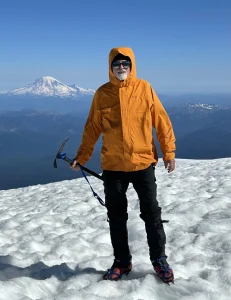
Rather than an ending, he discovered a new beginning: a pilgrimage through rural Mexico, volunteering with refugees in Poland, and leading a Zen peace vigil in Kyiv during a time of war.
These experiences, unplanned and often risky, awakened a fresh sense of vitality and service. By taking risks to step into the unknown, we expand beyond isolation and connect with something larger than ourselves.
In Kurt’s book Apprentice to the Wild, he said, “What if becoming an elder is not the end, but the beginning? What would it look like to shift the formula away from striving and achieving and toward simply giving ourselves away?”
Eldership, in this view, is not about retreating from the world but about living with generosity, vulnerability, and trust in the unfolding of life.
Closing Reflections
The conversation concluded with two evocative quotes that frame Kurt’s book. Environmental activist and author Wendell Berry reminds us: “It may be that when we no longer know what to do, we have come to our real work… The impeded stream is the one that sings.
Former President of the Czech Republic Vaclav Havel observes that hope “is an orientation of the spirit, and orientation of the heart… It is not the conviction that something will turn out well, but the certainty that something makes sense, regardless of how it turns out.”
Together, these insights call us to apprentice ourselves to the wildness within and around us—not as something to be controlled, but as a teacher and companion on the path toward resilience and planetary health. As Stephen reflected, wildness can transform not only how we live, but also how we exist and how we belong.
Watch the full forum:
About the Speakers
Kurt Hoelting grew up by the shores of Puget Sound in Washington and makes his home on an island in the Salish Sea. He has lived a migratory lifestyle his entire adult life, heading north every summer to work as a commercial fisherman and wilderness guide in Southeast Alaska. A graduate of the University of Washington and Harvard Divinity School, Kurt is an ordained minister, Zen practitioner and mindfulness teacher, who has sought to blend his passion for spiritual inquiry into his life on the wild edge of Alaska. He is the author of the recently published book Apprentice to the Wild (2025) and The Circumference of Home: One Man’s Quest for a Radically Local Life (2010).
Stephen Posner, PhD, is Director of the Pathways to Planetary Health initiative at the Garrison Institute. Stephen draws from scientific inquiry and contemplative practices to align human systems with nature. He builds understanding of nature across sectors and serves as a trusted advisor to policymakers and funders. Stephen has published over 50 technical and non-technical articles and reports on sustainability science, leverage points for systems change, and scientific assessment methods. His encounters with the wild include urban and suburban adventures growing up in Baltimore, solo retreats in the wilderness, and 20 years of rock climbing from Yosemite to the Spanish Pyrenees Mountains.

